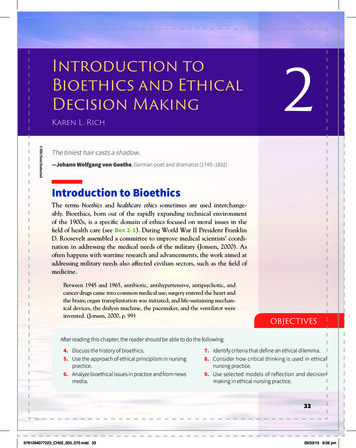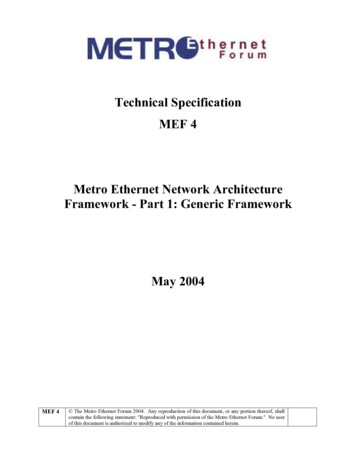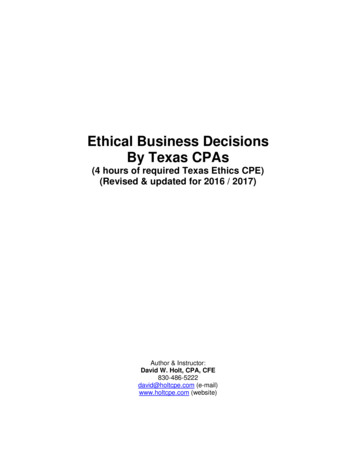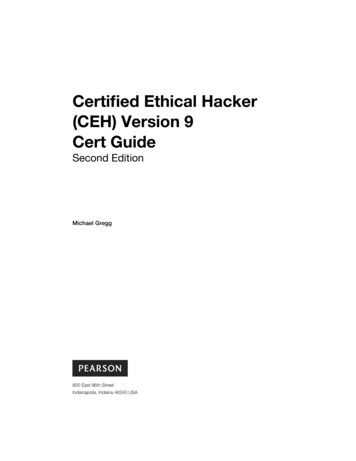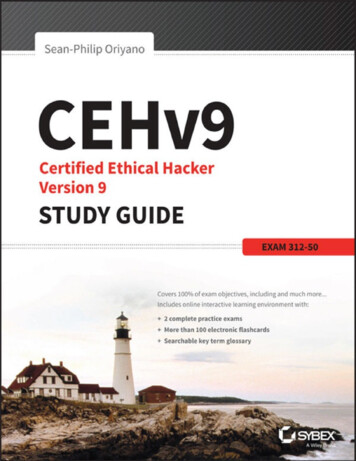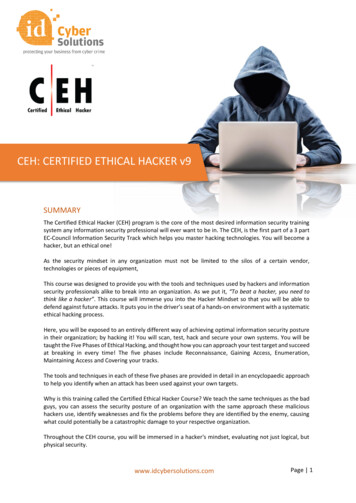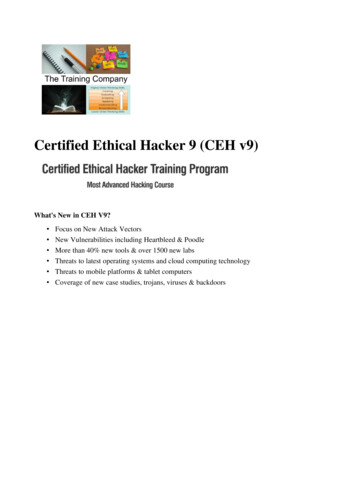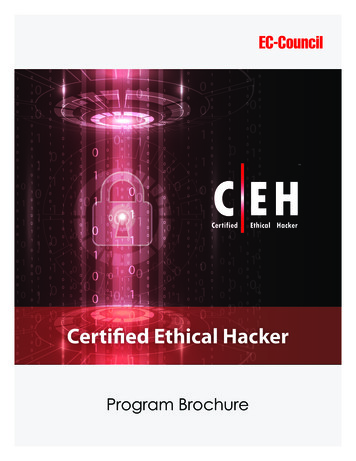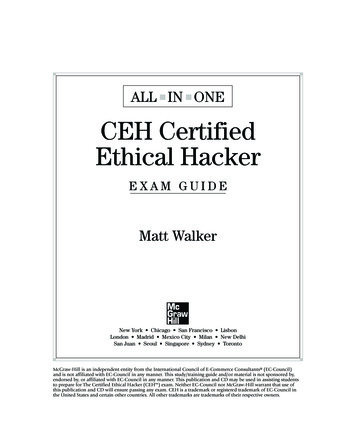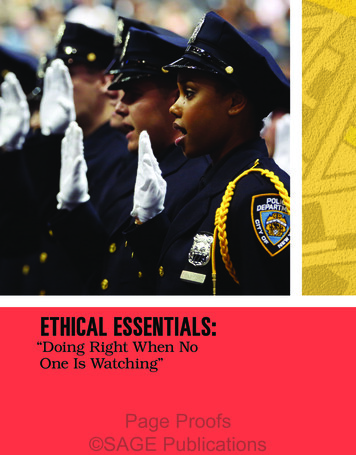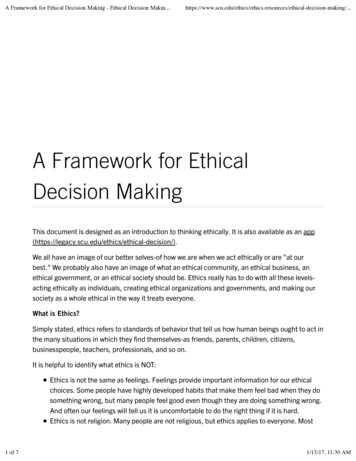
Transcription
A Framework for Ethical Decision Making - Ethical Decision ethical-decision-making/.A Framework for EthicalDecision MakingThis document is designed as an introduction to thinking ethically. It is also available as an /).We all have an image of our better selves-of how we are when we act ethically or are "at ourbest." We probably also have an image of what an ethical community, an ethical business, anethical government, or an ethical society should be. Ethics really has to do with all these levelsacting ethically as individuals, creating ethical organizations and governments, and making oursociety as a whole ethical in the way it treats everyone.What is Ethics?Simply stated, ethics refers to standards of behavior that tell us how human beings ought to act inthe many situations in which they find themselves-as friends, parents, children, citizens,businesspeople, teachers, professionals, and so on.It is helpful to identify what ethics is NOT:Ethics is not the same as feelings. Feelings provide important information for our ethicalchoices. Some people have highly developed habits that make them feel bad when they dosomething wrong, but many people feel good even though they are doing something wrong.And often our feelings will tell us it is uncomfortable to do the right thing if it is hard.Ethics is not religion. Many people are not religious, but ethics applies to everyone. Most1 of 71/13/17, 11:30 AM
A Framework for Ethical Decision Making - Ethical Decision ethical-decision-making/.religions do advocate high ethical standards but sometimes do not address all the types ofproblems we face.Ethics is not following the law. A good system of law does incorporate many ethicalstandards, but law can deviate from what is ethical. Law can become ethically corrupt, assome totalitarian regimes have made it. Law can be a function of power alone and designedto serve the interests of narrow groups. Law may have a difficult time designing or enforcingstandards in some important areas, and may be slow to address new problems.Ethics is not following culturally accepted norms. Some cultures are quite ethical, butothers become corrupt -or blind to certain ethical concerns (as the United States was toslavery before the Civil War). "When in Rome, do as the Romans do" is not a satisfactoryethical standard.Ethics is not science. Social and natural science can provide important data to help usmake better ethical choices. But science alone does not tell us what we ought to do.Science may provide an explanation for what humans are like. But ethics provides reasonsfor how humans ought to act. And just because something is scientifically or technologicallypossible, it may not be ethical to do it.Why Identifying Ethical Standards is HardThere are two fundamental problems in identifying the ethical standards we are to follow:1. On what do we base our ethical standards?2. How do those standards get applied to specific situations we face?If our ethics are not based on feelings, religion, law, accepted social practice, or science, whatare they based on? Many philosophers and ethicists have helped us answer this critical question.They have suggested at least five different sources of ethical standards we should use.Five Sources of Ethical StandardsThe Utilitarian ApproachSome ethicists emphasize that the ethical action is the one that provides the most good or doesthe least harm, or, to put it another way, produces the greatest balance of good over harm. Theethical corporate action, then, is the one that produces the greatest good and does the leastharm for all who are affected-customers, employees, shareholders, the community, and theenvironment. Ethical warfare balances the good achieved in ending terrorism with the harm doneto all parties through death, injuries, and destruction. The utilitarian approach deals withconsequences; it tries both to increase the good done and to reduce the harm done.The Rights ApproachOther philosophers and ethicists suggest that the ethical action is the one that best protects andrespects the moral rights of those affected. This approach starts from the belief that humanshave a dignity based on their human nature per se or on their ability to choose freely what they do2 of 71/13/17, 11:30 AM
A Framework for Ethical Decision Making - Ethical Decision ethical-decision-making/.with their lives. On the basis of such dignity, they have a right to be treated as ends and notmerely as means to other ends. The list of moral rights -including the rights to make one's ownchoices about what kind of life to lead, to be told the truth, not to be injured, to a degree ofprivacy, and so on-is widely debated; some now argue that non-humans have rights, too. Also, itis often said that rights imply duties-in particular, the duty to respect others' rights.The Fairness or Justice ApproachAristotle and other Greek philosophers have contributed the idea that all equals should betreated equally. Today we use this idea to say that ethical actions treat all human beingsequally-or if unequally, then fairly based on some standard that is defensible. We pay peoplemore based on their harder work or the greater amount that they contribute to an organization,and say that is fair. But there is a debate over CEO salaries that are hundreds of times larger thanthe pay of others; many ask whether the huge disparity is based on a defensible standard orwhether it is the result of an imbalance of power and hence is unfair.The Common Good ApproachThe Greek philosophers have also contributed the notion that life in community is a good in itselfand our actions should contribute to that life. This approach suggests that the interlockingrelationships of society are the basis of ethical reasoning and that respect and compassion for allothers-especially the vulnerable-are requirements of such reasoning. This approach also callsattention to the common conditions that are important to the welfare of everyone. This may be asystem of laws, effective police and fire departments, health care, a public educational system,or even public recreational areas.The Virtue ApproachA very ancient approach to ethics is that ethical actions ought to be consistent with certain idealvirtues that provide for the full development of our humanity. These virtues are dispositions andhabits that enable us to act according to the highest potential of our character and on behalf ofvalues like truth and beauty. Honesty, courage, compassion, generosity, tolerance, love, fidelity,integrity, fairness, self-control, and prudence are all examples of virtues. Virtue ethics asks of anyaction, "What kind of person will I become if I do this?" or "Is this action consistent with my actingat my best?"Putting the Approaches TogetherEach of the approaches helps us determine what standards of behavior can be consideredethical. There are still problems to be solved, however.The first problem is that we may not agree on the content of some of these specific approaches.We may not all agree to the same set of human and civil rights.We may not agree on what constitutes the common good. We may not even agree on what is agood and what is a harm.3 of 71/13/17, 11:30 AM
A Framework for Ethical Decision Making - Ethical Decision ethical-decision-making/.The second problem is that the different approaches may not all answer the question "What isethical?" in the same way. Nonetheless, each approach gives us important information withwhich to determine what is ethical in a particular circumstance. And much more often than not,the different approaches do lead to similar answers.Making DecisionsMaking good ethical decisions requires a trained sensitivity to ethical issues and a practicedmethod for exploring the ethical aspects of a decision and weighing the considerations thatshould impact our choice of a course of action. Having a method for ethical decision making isabsolutely essential. When practiced regularly, the method becomes so familiar that we workthrough it automatically without consulting the specific steps.The more novel and difficult the ethical choice we face, the more we need to rely on discussionand dialogue with others about the dilemma. Only by careful exploration of the problem, aided bythe insights and different perspectives of others, can we make good ethical choices in suchsituations.We have found the following framework for ethical decision making a useful method for exploringethical dilemmas and identifying ethical courses of action.A Framework for Ethical Decision MakingRecognize an Ethical Issue1. Could this decision or situation be damaging to someone or to some group? Does thisdecision involve a choice between a good and bad alternative, or perhaps between two"goods" or between two "bads"?2. Is this issue about more than what is legal or what is most efficient? If so, how?Get the Facts3. What are the relevant facts of the case? What facts are not known? Can I learn more aboutthe situation? Do I know enough to make a decision?4. What individuals and groups have an important stake in the outcome? Are some concernsmore important? Why?5. What are the options for acting? Have all the relevant persons and groups been consulted?Have I identified creative options?Evaluate Alternative Actions6. Evaluate the options by asking the following questions:4 of 71/13/17, 11:30 AM
A Framework for Ethical Decision Making - Ethical Decision ethical-decision-making/.Which option will produce the most good and do the least harm? (The Utilitarian Approach)Which option best respects the rights of all who have a stake? (The Rights Approach)Which option treats people equally or proportionately? (The Justice Approach)Which option best serves the communityas a whole, not just some members?(The Common Good Approach)Which option leads me to act as the sort of person I want to be? (The Virtue Approach)Make a Decision and Test It7. Considering all these approaches, which option best addresses the situation?8. If I told someone I respect-or told a television audience-which option I have chosen, whatwould they say?Act and Reflect on the Outcome9. How can my decision be implemented with the greatest care and attention to the concernsof all stakeholders?10. How did my decision turn out and what have I learned from this specific situation?This framework for thinking ethically is the product of dialogue and debate at the Markkula Centerfor Applied Ethics at Santa Clara University. Primary contributors include Manuel Velasquez,Dennis Moberg, Michael J. Meyer, Thomas Shanks, Margaret R. McLean, David DeCosse, ClaireAndré, and Kirk O. Hanson. It was last revised in May 2009.Aug 1, 2015Use the Ethical DecisionMaking App»Ethics in the NewsThe "Most Secure"Building in /the-mostsecure-buildingin-manhattan/)Is the Secret Service aTrump Tower Amenity?5 of 71/13/17, 11:30 AM
A Framework for Ethical Decision Making - Ethical Decision ethical-decision-making/.Cryonics yonicsethics/)Is it ethical to freeze yourbody after you die?Standing up tions/standingup-for-nonviolence/)Bishop Taiji Katsuya ofJapan shares his views onmilitary force, the deathpenalty, and PresidentObama's visit to Hiroshima.Tackling the FakeNews acklingthe-fakenews-problem/)The Trust Project is workingto come up with tools toimprove trust in themainstream media.Trump's PotentialConflicts of trumpspotential-conflicts-6 of 71/13/17, 11:30 AM
A Framework for Ethical Decision Making - Ethical Decision ethical-decision-making/.of-interest/)What does thePresident-elect need to do toseparate his political andprivate interests?Trust ProjectHackathon in ustproject-hackathonin-london/)Participants worked todevelop indicators of trust ata recent Trust ProjectChallenge in London.7 of 71/13/17, 11:30 AM
Simply stated, ethics refers to standards of behavior that tell us how human beings ought to act in the many situations in which they find themselves-as friends, parents, children, citizens, businesspeople, teachers, professionals, and so on.
